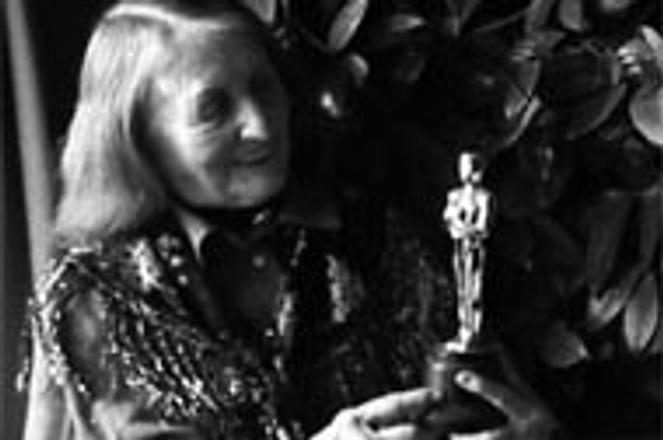Best supporting actress. Not quite, but Vilma Jamnická has relished acting in supporting roles because as she says, "you can go home at night after work."Mike Patterson
When it comes to the history of Slovak film, no one should know more about it than actress Vilma Jamnická who, after all, has lived through most of it. The actress was born in 1906, not long after the first public screening of a motion picture. She remembers her first film only as "a war movie." "More German soldiers were killed in the film than there were Germans in it," she said. "Communism always defeated fascism in our movies."
After that first film, her memories are less keen. There is nothing particularly wrong with her powers of recall, it's just that she has appeared in over 500 roles in her career.
Out of those numerous roles she liked the minor ones the best. "I like small roles, " she explained, "because you can earn more with less effort. A star carries a lot of responsibility and has to be there all the time, but in smaller parts you can go home when you're finished. I never had any ambition to be a big star. Witches, farmer's wives, wealthy old ladies, I enjoyed playing all of these roles in their richness."
Special parts that stand out for her were her roles as a Gypsy woman in "Červene Vino" (Red Wine) , as a witch in "Janošik", and "Keď sa dot knes hviezda" (When You Touch the Stars) and most of all as an old grandmother in a Hungarian television program about the writer Rasputin (not the famous "mad monk" of Czarist Russia), directed by her favorite director Lazlo Nemere in the mid 1980s.
Nemere and Jamnická hit it off right from the start. "When I first spoke with him, he said I was too young for the role," Jamnická said with a smile. "I was only 79, and the part called for a woman of 80, so he asked me to put him in touch with my mother!" Off-screen, Jamnická has always explored the unusual, embracing Asian philosophies like Buddhism and yoga, as well as being a vegetarian. These pursuits may seem normal in the 1990s, but they raised some eyebrows in "red" 1950's Czechoslovakia.
Rebel before her time. Vilma Jamnická was interested in Asian philosophies and tea well before the "New Age."Courtesz of Linia Magazine
Over the years she has amassed a wealth of esoteric knowledge, authoring a number of works on astrology and claiming knowledge of a tea that makes babies. "Not even the experts know about it," she said mysteriously. "It has made children for at least twenty five people, but it's tough to grow in Bratislava, or there would be more children in this country."
More recently, she has been working with world-famous director Juraj Jakubisko on "Better to be Healthy and Rich than Sick and Poor," in which she plays an uneducated nun who is forced out onto the street by the communists, and who is unable to cope with life, clinging tenaciously to the film's main characters for survival. The nun lives with over 20 cats in an abandoned room, and in one scene the cats run in every direction when her neighbours break through the wall to expand their flat. "Thank god it was only one scene!" said Jamnická. "I don't like cats. They had every kind and size, black, grey, even a blue one. In real life I live with just two of them, and they eat more than I do. I have to admit, I did like the blue one."
She is also featured in Jakubisko's "Unclear Report about the End of the World", a Czech film, released last spring, which has already been previewed in Bratislava but will have a general release this spring. The film prophesies the coming millennial catastrophe and treats themes like the cycle of poverty in South America and, of course, love. "This director shoots a lot but keeps little, which comes out quite well. Of the three themes, love comes out strongest," said Jamnická. "He (Jakubisko) likes to use the theme of 'the honest fool,' which caused his earlier works to be locked up by the communists," she said.
Jamnická claimed to have really enjoyed the shooting of the film. "Everyone was always nice to me on the set. There were always two young men to help carry me up hills or through the snow. Half a year of shooting outdoors in fresh air was beautiful, and nature really helped my health. I got sick at one point, but I have a tea that not even the best doctors know about, so..." The energetic "young" actress could talk about tea for hours without ever giving away her secret.
Author: Mike Patterson

